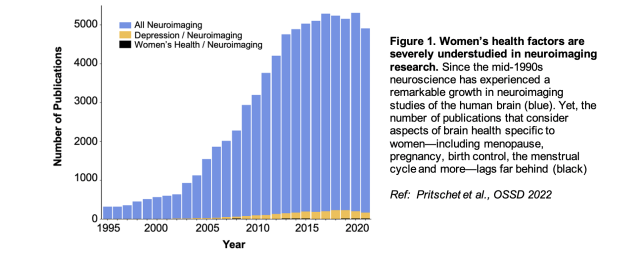The Ann S. Bowers Women’s Brain Health Initiative: Leveraging AI to Advance Women’s Health
The problem. Positioning women’s health as equal to men’s health in the biomedical sciences will require “a global shift in science culture” (Shansky et al., 2021). Historically, neuroscience has overlooked aspects of the human condition specific to women (see Figure 1). We know little of how menopause, pregnancy, the menstrual cycle, and hormone-based medications influence the brain. Yet, sex hormones are powerful neuromodulators of learning and memory that may contribute to the sex- skewed prevalence of major neurological conditions. Women are at twice the risk of major depressive disorder and Alzheimer’s disease. Gaining traction on these problems depends on our willingness to invest in women’s health.
The solution. Increased funding for research in women’s health “will unleash staggering returns” (Bird et al., 2022). The Ann S. Bowers Women’s Brain Health Initiative (WBHI) is taking a Big Data approach to women's brain health, pooling MRI and standardized health metrics across UC brain imaging centers. Leveraging the computational power of AI on this wealth of data will improve the study of women’s brain health. Executing this vision requires a sustained effort across sectors. The University of California is in a unique position to lead these efforts, in conjunction with partner institutions, by combining world-class expertise in brain imaging, computer science/AI, and healthcare.
The UC’s role. The University of California is home to state-of-the-art Brain Imaging Centers dedicated to research. Together, these centers generate data from thousands of unique participants annually, a scale unmatched by any other university system. We propose to leverage this untapped resource, with strategic partnerships with other Universities. The goal is to build a population-level brain imaging database that harnesses the computational power of deep learning and AI to transform the study of women’s brain health across the life course.
This work is generously supported by the Noyce Trust and UC Partnerships in Computational Transformation. We are grateful for previous support from the SAGE Center for the Study of the Mind, Hearst Foundation, Harvey L. Karp Discovery Award, and Hellman Fellows Fund.
Learn More:
- Shansky, R. M., & Murphy, A. Z. (2021). Considering sex as a biological variable will require a global shift in science culture. Nature Neuroscience.
- Bird C. (2022) Doubling NIH Funding for Women's Health Would Yield Substantial Return on Investment. RAND.
- Pritschet L., et al. (2022) Factoring women's health into brain imaging. OSSD National Institutes of Health / Office of Research on Women’s Health Science Policy Symposium
- Taylor C., Pritschet L., & Jacobs E.G. (2021) The scientific body of knowledge – whose body does it serve? A spotlight on oral contraceptives and the brain. Frontiers in Neuroendocrinology (Elsevier Press) Special Issue “Beyond Sex Differences: A Spotlight on Women's Brain Health”
